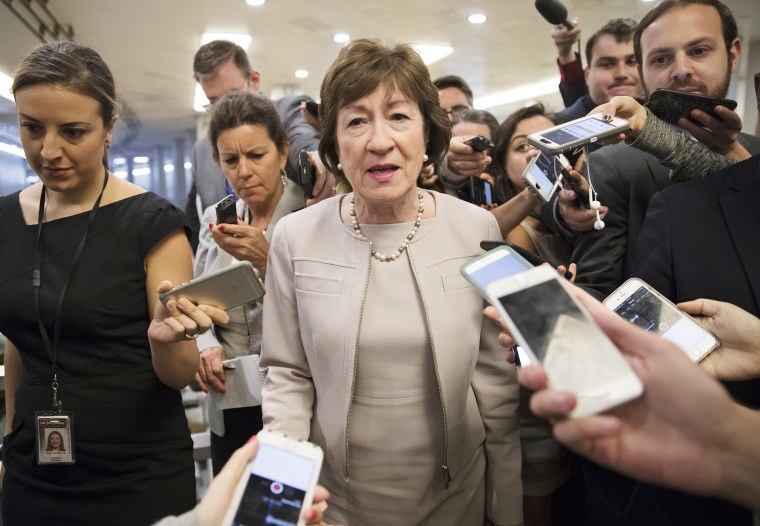WASHINGTON — Following the demands of their leaders, congressional Democrats and Republicans remained entrenched on their partisan sides of the health care debate until the very end.
But now that Senate Republicans were unable to repeal Obamacare, some are saying the answer is to work together — and in fact a group of moderates on both sides of aisle have quietly been talking for weeks to try to find some common ground.
After he tanked Republican efforts to pass health care legislation, Sen. John McCain, R-Ariz., doubled down on his message of bipartisanship.
"The vote last night presents the Senate with an opportunity to start fresh," McCain said in a statement. "It is now time to return to regular order with input from all of our members — Republicans and Democrats — and bring a bill to the floor of the Senate for amendment and debate."
Senate Minority Leader Chuck Schumer, D-N.Y., said he was "relieved" that Obamacare wasn’t dismantled and he suggested a few areas where Republicans and Democrats could work together to fix problems with the Affordable Care Act.
"I hope what John McCain did will be regarded in history as a turning point where the Senate turned back from its partisanship and started working together," Schumer said at a news conference Friday morning.
Republican leaders, fresh off a stinging defeat that left Senate Majority Leader Mitch McConnell looking stunned on the Senate floor, haven't issued any statements welcoming outreach across the aisle.
Related: Obamacare Repeal Fails: Three GOP Senators Rebel
However, there are signs that Republicans and Democrats can work together — and they already are.
A group of moderate Republicans and Democrats have been talking for the past few weeks over the phone and via text message, according to two Senate aides, although both sides acknowledged that talks wouldn't go anywhere until the GOP effort at repeal was finished.
But as the Republicans’ prospects for success started to dwindle this week, a group of Democratic and Republican senators — including Susan Collins, R-Maine, Joe Manchin, D-W.Va., Heidi Heitkamp, D-N.D., and Bill Nelson, D-Fla. — had dinner at a restaurant in Washington Wednesday night to advance talks.
The members tried to hide it from their staff and were texting each other directly to make plans, two aides said.
But after the failure of Obamacare repeal, members 'fessed up.
"We’ve tried to stay in touch throughout this time," said Sen. Mike Rounds, R-S.D., who is among the group of bipartisan senators. "We’re trying to find common ground about where we go after this, because one way or another, regardless of if we were successful or they were successful, we wanted to find a bipartisan approach to get things moving in the future."
Nelson said in a statement: “Sen. Collins and I have discussed this issue many times and we are now working together. As former state insurance commissioners, we know how complicated this issue is and we are working with a small bipartisan group of senators equally dedicated to finding real solutions."
But some Republicans, still stung by the shock of defeat, say the fight is not over. House Speaker Paul Ryan read lyrics from the song "The Wreck of the Edmund Fitzgerald," likening it to what happened Friday in the Senate with health care and vowing to fight on.
"I am disappointed and frustrated, but we should not give up," Ryan said.
Republicans also expressed doubt that Democrats would be a legitimate negotiating partner.
"I’m always open to working with Democrats, but the problem is they tell us they want to fix Obamacare — but I haven’t seen a fix," said Rep. Tom Cole, R-Okla.
The individual insurance market in some areas of the country is collapsing, as insurers, repelled partly from the uncertainty in Washington alongside some structural problems with the market, are exiting and leaving some consumers with only once choice for insurance.
"Nobody has said Obamacare is perfect," Schumer said. "Nobody has said our healthcare system doesn't need fixing. The problem was when they tried to just pull the rug out from under the existing healthcare system."
Sen. Lamar Alexander, R-Tenn., chairman of the Senate health and labor committee, which oversees large parts of health care law, had kept criticism of the tightly controlled process to himself. But that changed last week when Republican efforts seemed doomed. He announced last week that he plans to hold hearings on ways to shore up the individual insurance market. Much of his state has only one insurance option.
"The Senate health committee has a responsibility during the next few weeks to hold hearings to continue exploring how to stabilize the individual market," Alexander said in a statement last week. "My main concern is doing all I can to help the 350,000 Tennesseans and 18 million Americans in the individual market who may literally have no options to purchase health insurance in 2018 and 2019."
Sen. Patty Murray, D-Wash., the top Democrat on the health committee, was so furious at Republican repeal efforts, especially the attempts to defund Planned Parenthood, that she stopped all negotiations with Alexander on health care and unrelated pressing issues.
Immediately after the repeal vote ended, their relationship immediately changed. Murray walked over to Alexander to restart business.
As McCain said: "I have great faith in the ability of the senator from Tennessee, Lamar Alexander, the senator from Washington, Patty Murray, and others to work together in a bipartisan fashion to craft a bill that increases competition, lowers costs, and improves care for the American people."

